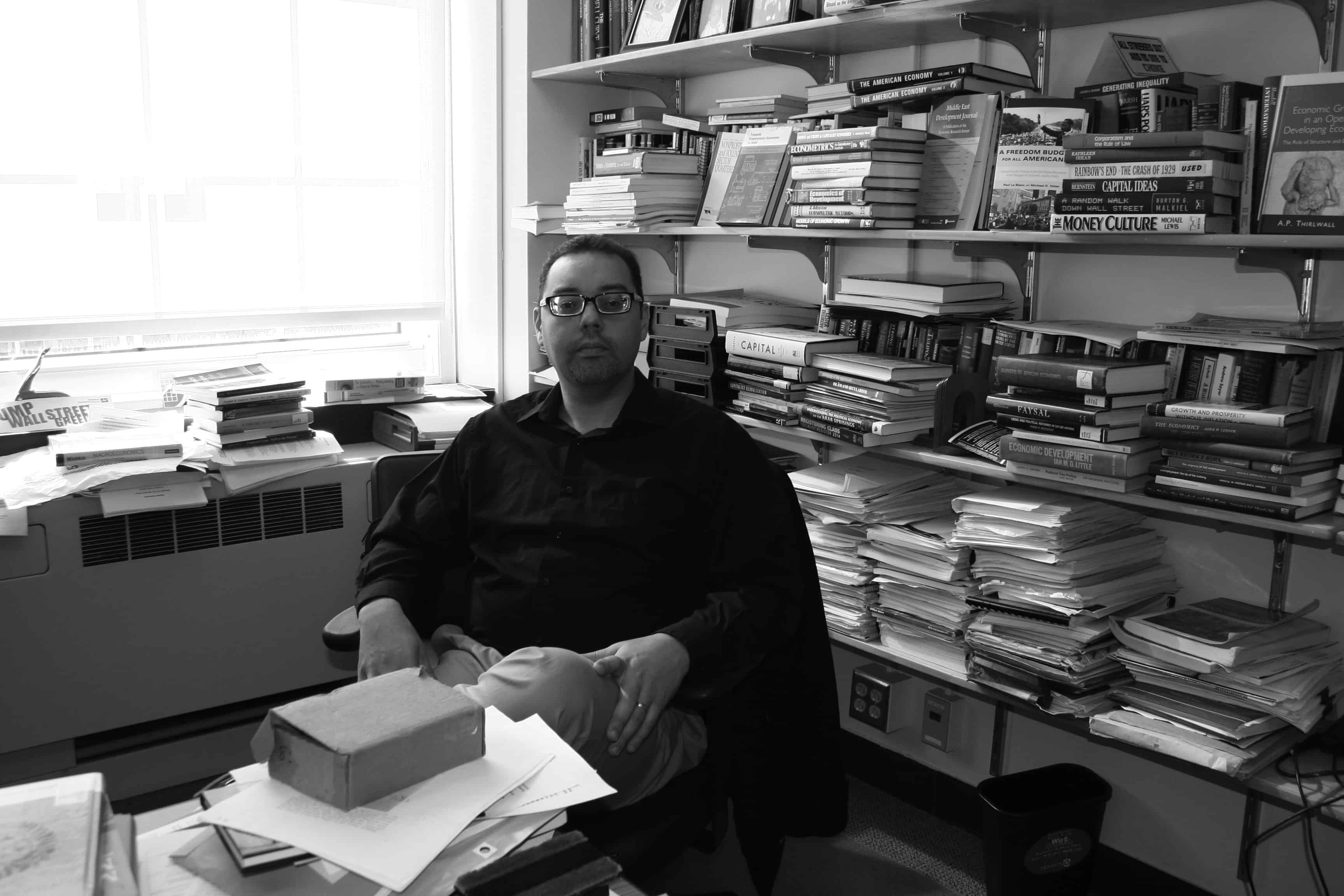By Ellen McDevitt-Stredney
Staff Writer
As the leaves turn red and orange here in Granville, there is another, singular leaf that now shines bright green: the verdant logo of the Binzagr Institute for Sustainable Prosperity. This new think-tank, dedicated to post-Keynesian economic and social thought, has come to life on the Hill this very semester under the leadership of economics professor Fadhel Kaboub. Although Binzagr has yet to be formally “announced,” it has already gained a worldwide following online and gained the patronage of the college.
Associate Professor of Economics Kaboub will serve as the President of the fledgeling Binzagr. He is known for his research focus on “Let’s fight poverty, not the poor”. Kaboub completed his doctorate in economics at University of Missouri, Kansas City, which now partners with Denison in hosting the Institute. Employment policy is the center of the interdisciplinary research, creating alternative solutions and building cooperation with non-profits, policymakers, businesses, local and global changemakers and institutions.
Kaboub explained the inspiration of the institute. “A lot of things do not generate a lot of profit, but they generate well being. This doesn’t mean that they are not essential for our society to function.” Investing in well being, to the Institute, means that society should be able to find decent employment and decent pay for people that are willing to learn, willing to work and willing to help it.
Kaboub thinks employment is a basic human right. “All these negative effects of unemployment: the psychological and suicidal effects, alcoholism and violence, the social effects of unemployment will all greatly diminish once we invest in people,” he said. With non-profits needing volunteers and the unemployed needing work, Kaboub points out how we can put these pieces together.
The Institute believes that businesses and government policies should adhere to the “triple bottom line”: Profits, People, Planet, as opposed to the “single bottom line” ideology of laissez-faire free market capitalism: profits only. “We simply focus on prosperity instead of profit,” Kaboub said. In an effort to move away from conservative and traditional economic thought, the institute’s neo-liberal economics are knowingly leaning left.
President Weinberg recognized both the importance of this type of research, and its possible controversy. “This is going to be a great idea for Denison, and it increases Denison’s visibility,” he said. “Yes, it’s controversial. But you know what? That’s life.” Weinberg is excited about the Institute’s embrace of pluralistic thought. Pulling in philosophers, scientists, economists, legal scholars and more, Kaboub says, “the scholarship being produced on this campus is parallel to what we are doing. It’s a perfect fit.”
The think-tank will publish working papers, more technical and theoretical papers aimed for researchers, and public policy notes, which according to Kaboub serve as “the thriving section of the Institute.” The policy notes are more accessible to the general public and will be pushed into the mainstream media, politics and government.
Kaboub expressed how negative the media can be, sending the message that there are no ways to fix unemployment and international economic issues. “The stuff you hear on CNN and Fox News is not all that’s out there,” he said. The Institute’s publications will be available on their website, and will be written in a variety of disciplines. The research assistants hired by Denison will even be able to publish their own work.
Kaboub’s current assistants are Frances Osei-Bonsu ‘15; an economics major from Accra, Ghana; Alex Lloyd ‘15, an economics major from Upper Arlington, Ohio; Phillip Papaioannou ‘17, an economics major from Morton Grove, Illinois; and Kristóf Oltvai ‘15, a creative writing and philosophy major from Pittsburgh, Pa.
Osei-Bonsu is excited about writing her own public policy note. “It’s pretty cool that we can pick our own topic, do our own research and learn these research skills that are similar to a dissertation in graduate school,” she said. Lloyd added how useful the experience will be for job searching and said “it’s a great opportunity for students and it brings in a new group each year.”
“The Institute invests in quality of life,” said Papaioannou. Papaioannou’s research will tie in his love of athletics and the economic benefits sports can bring to communities.
The think-tank is meant to make connections. The publications will be available to students and they can see how subjects in different classes apply in these global conversations. The Institute’s first annual conference will be held at Denison next fall, and the first set of working papers will be published by November 1st. “We are opening the policy space,” said Kaboub. “We do have options, we do have solutions, and we are not debating theory for arguments sake. We are showcasing alternatives.”
Visit www.binzagr-institute.org to see the think-tank in action.

